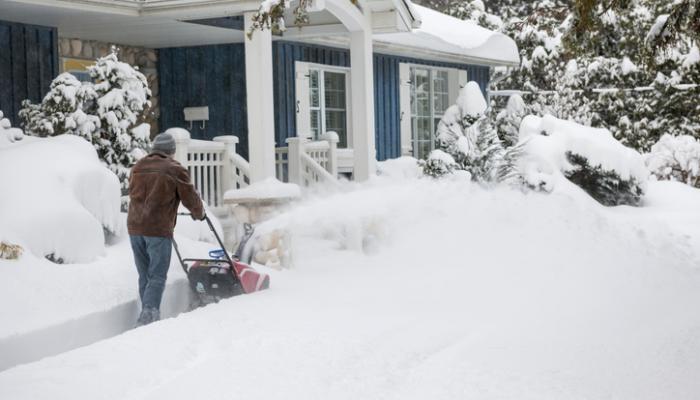When it comes to knowing what to fix when selling a house, it’s important to remember your end goal. Are you wanting to sell your home as-is or quickly, regardless of the price? Or are you aiming to maximize your profit and willing to invest in upgrades and costly repairs?
Knowing the answers to these questions will guide your decision-making process regarding things to repair before selling a house. In addition to keeping your home selling objectives in mind, it’s essential to consider who your target homebuyers will be. Most buyers rely on financing, meaning the home must pass a lender's appraisal and inspection requirements.
Should I fix up my house before selling it?
Some home programs, such as FHA and VA loans, require a passing home appraisal. This means that for some buyers, if your home doesn’t pass inspection, a lender will not approve their loan.
“Always prioritize the repairs that, if they go unresolved, will result in your home not passing an inspection. This will open up your home to buyers who are using a lender and a type of loan that may require a strict inspection process or have specific property requirements.”
At the same time, some cosmetic repairs to your home can significantly enhance its appeal and potentially increase its value.
Consider the Current Market and Recent Sales in Your Area
The current housing market and comparable sales near you (or comps) are two excellent tools for determining what repairs you should address before selling.
“If the market is hot and buyers are more desperate to find homes, they are more likely to overlook needed repairs. For times when homes are selling more slowly, it’s best to make your home as appealing as possible to beat out the competition,” Aspey said.
One of the greatest assets a real estate agent can provide is their ability to scope the current market and examine comparable home sales. Determining what needs to be fixed before selling should be based on recent market data and objective analysis, which can be difficult for a home seller to do on their own.
Whether you are selling yourself or collaborating with a real estate professional, consider asking these questions before you make a final decision to spend the time and money to repair or replace something within your home.
Questions to Ask Yourself & Your Real Estate Agent:
- If I don’t repair/replace this, will it keep buyers from making an offer?
- Would it be better to remove this item entirely instead of spending money to fix it?
- Will this repair greatly increase the value of my home?
- Is the repair necessary for my home to pass inspection?
- Will this improvement bring in more offers from buyers?
- Will this repair prevent me from listing my home in a timely manner?
Determining your budget for repairs before starting any upgrades will also help you prioritize and stay within your financial limits. Remember, the goal should be to make your home livable and showcase its potential, not to achieve perfection.
Don’t Fix These 6 Things When Selling
Knowing what to fix before selling a house can be challenging. There’s really no universal answer other than to fix what is within your budget, in alignment with your goals, and likely to provide a good return on investment.
However, there are some general things you can consider, like what buyers in your neighborhood will expect. If you invest in a bunch of high-end upgrades but live in a less desirable area, your renovations likely won’t pay off as much as you hope.
It’s also almost always better to fix structural issues over cosmetic upgrades, but every home and situation is unique.
What Not to Fix When Selling a House
We spoke to top Veterans United Realty agents Lisa Sparks and Neil Brooks for advice on home fixes that homeowners should avoid. Brooks has multiple decades of experience while Sparks is rounding out her first decade in home realty at the end of 2024. With the help of these two experts, we created a list of six things that can typically go unrepaired or unrenovated when it comes time to sell.
#1: Skip the Major Kitchen Renovation
Unless your kitchen needs major upgrades to ensure it meets safety standards, you can probably skip it. While kitchens are very important to buyers, potential buyers will have different tastes and might have plans for the space, making your investment less valuable.
“Kitchen remodels can be very expensive and time-consuming. Instead, focus on minor updates like painting cabinets or replacing hardware to give a fresh look without breaking the bank," Brooks said.
#2 Don’t Worry About Matching Current Trends
What’s trendy might not appeal to every buyer. Potential buyers may have different tastes and preferences, which means your investment might not resonate with them.
“Trends come and go. Presenting a home that is clean, properly functioning, and has been well-maintained is much more important than matching every passing trend."
#3 Replacing Functional Light Fixtures Isn’t Worth it
To our last point, lighting fixtures are often an item that people consider updating to match current trends. The lighting in your home should be functional, so you typically don’t need to spend hundreds or thousands of dollars on fancy new fixtures. Instead of focusing on the light fixture’s appearance, prioritize making sure the light throughout your home is optimal for staging and listing photos.
#4 High-End Landscaping Can Be Burdensome
Your lawn should appear clean and manicured. That’s it. You don’t have to do a complete landscape overhaul to impress those driving by. It’s likely your ideal homebuyer will discover your home through their own real estate agent or an online platform anyway. Besides, there are many affordable ways to make your lawn attractive to homebuyers.
To this point, Brooks says, “While curb appeal is important, extensive and expensive landscaping projects might not significantly increase your home’s value. Buyers might also view it as high-maintenance. Stick to basic yard cleanup, mowing the lawn, and planting some inexpensive flowers to enhance the appearance without over-investing.”
#5: Simple Bathroom Fixes Can be Impactful
“Similar to kitchen renovations, high-end bathroom upgrades can be costly and might not provide a good return on investment. Buyers often prefer to customize these spaces themselves. Simple fixes like re-caulking, cleaning grout, or updating fixtures are more cost-effective and can still make a big difference,” Brooks said.
#6: Keep Outdated Windows and Doors
While a brand-new exterior door would enhance your home’s aesthetic appeal, it can be quite expensive to replace. The same goes for windows. As such, replacing windows and exterior/interior doors is not cost-effective and doesn’t significantly contribute to the sale of the home.“Although new windows can improve energy efficiency, they are a major expense that you might not recoup in the sale price. If the windows are in decent condition, consider minor repairs and a good cleaning instead. Leave the decision for a full replacement to the new homeowners.”
Bonus Tip: Staging is Vital
Staging is essential to attract the right kind of homebuyer, especially for more pricey homes. However, you don’t have to stage every single room in your house. Focus on staging the kitchen, main living spaces, and bedrooms. Storage rooms, extra bathrooms, and offices can be left as open spaces.
Things You Should Repair Before Selling
On the flip side of things not to fix, there are things you should almost always address when preparing to sell.
“Your listing always gets the greatest amount of exposure in the first few days on the market. So, making repairs before you list and present your home to the world online is critical for maximizing your return. It also allows you to take your time selecting the best professionals rather than rushing to get whomever can meet the repair deadline in a contract,” Sparks said.
What to Repair Before Selling a Home
What you should invest in before selling your home is anything that will give you a return on investment (ROI). To secure an ROI, you’ll want to invest in home improvements that will widen your buying pool and/or allow you to increase your home selling point.
Worthwhile investments are those that a) ensure your home meets loan program property standards and b) widen your buying pool.
Ensure the Home Meets Minimum Safety Standards
Mortgage programs that require an appraisal have minimum property standards set by the board regulating that loan program. Accredited appraisers will use these standards as guidelines when evaluating the homes for sale. While these standards may differ slightly between loan programs, generally, they dictate that a home must be “safe, sound, and sanitary.”
Here are four issues that often get sellers in trouble with these appraisal programs:
- Plumbing and Electrical: Do you have an automatic garage door that’s been malfunctioning or refusing to open? How about a garbage disposal that stopped working a few months ago? While those may not bother you, it may deter home buyers from making an offer.
- Pests: From minor pest infestations such as gnats in the kitchen to more extreme cases like termites, fleas, cockroaches, mice, or bats in the attic, any pest presence and the damage they caused need to be addressed before your home goes up for sale.
- Mold: Known as every home seller’s nightmare, mold is a sale-stopper if discovered during the inspection process. If you know of any mold, it’s advised that you have it professionally removed for your own health and to avoid losing out on a potential sale.
- Safety Standards: Ensure that all safety systems are in place and potential hazards are eliminated. For example, fire alarms and carbon monoxide detectors should all be in working condition, and all home railings should be firmly secured.
“If you have a leaky roof or cracked foundation, a lender will likely require these to be repaired before closing. So, you might as well get ahead of the game and repair these structural issues.
In Florida, the majority of private carriers will not issue a new policy on a home if the roof is more than 10 years old. So this is a big one for us right now. Homeownership has become expensive and most buyers do not have the ability to buy a new roof right away and will therefore avoid your listing if the roof has not been addressed,” Sparks said.
Neutral Decorating Means a Bigger Buyer Pool
“Buyer appeal is where you can really get some bang for your buck, as these items will attract the most buyers and allow for competition and maximizing profits. Neutral paint colors, continuous flooring throughout the home, and clean, clean, clean. It's amazing what fresh caulking can do for baseboards, bathrooms, and windows,” Sparks said.
Everyone is entitled to decorate their homes in a manner that aligns with their own personal taste. However, a potential buyer may not give your bright pink home with green trim a second glance. To help buyers envision their life in your home, consider repainting any vividly colored exterior or interior walls with more neutral tones.
Turning a bedroom into a home theater or a garage into a gym might seem like a value-adding improvement, but it can limit the appeal to a broader audience. Buyers appreciate the flexibility and ability to envision the space for their own needs. Maintain rooms in their traditional roles to attract more potential buyers.
At the same time, if you’ve left any home projects unfinished, you should wrap them up before listing the home for sale. Did you start removing the kitchen cabinet doors with the plan to create a more open concept? Were you only able to get the bedroom upstairs partially painted before you got distracted? Projects that are half-finished can detract from the overall appeal of your home and should be completed before listing it for sale.
Oftentimes, home sellers fall into the over-improvement trap, thinking they need to undergo extensive repairs and renovations to prepare their homes for sale. However, it's important to approach these enhancements with a balanced perspective.
No repairs, renovations, or replacements should exceed your budget or be used as a procrastination method to actually list the home. By focusing on strategic improvements that align with your budget and selling goals, you can effectively enhance the appeal of your property and attract the right buyers.
Related Posts
-
 How Often Should You Shop for Homeowners Insurance?You should try to review your homeowners insurance options at least once a year. Here's a guide on how often you should shop and compare home insurance.
How Often Should You Shop for Homeowners Insurance?You should try to review your homeowners insurance options at least once a year. Here's a guide on how often you should shop and compare home insurance. -
 Five Essential Tips for Selling Your Home This WinterWinter is usually a slower time for real estate, but it also provides some unique opportunities to show off your home to particularly motivated buyers. Here are five tips for selling your home in a winter wonderland.
Five Essential Tips for Selling Your Home This WinterWinter is usually a slower time for real estate, but it also provides some unique opportunities to show off your home to particularly motivated buyers. Here are five tips for selling your home in a winter wonderland.


